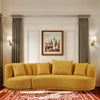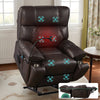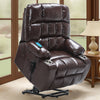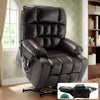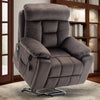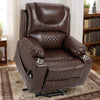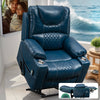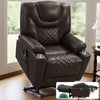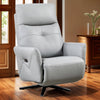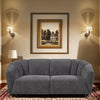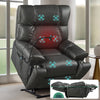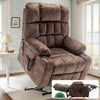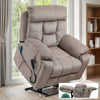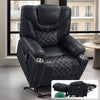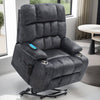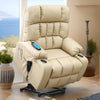The Importance of Choosing the Right Recliner for Elderly Care
Understanding the Specific Needs of the Elderly
As we age, our bodies require more support and comfort. Elderly individuals often face mobility issues and joint pain. A well-chosen recliner can greatly improve their quality of life. It's crucial to consider factors like easy entry and exit, proper back support, and adjustable positions. Recliners should also accommodate any medical conditions or physical limitations. For instance, those with arthritis may need chairs with smooth, easy-to-use mechanisms. The right recliner can provide relief from pain, improve circulation, and promote better posture. It's not just about comfort – it's about maintaining independence and enhancing overall well-being.

Evaluating Recliner Ergonomics and Accessibility
When selecting a recliner for the elderly, ergonomics is key. The chair should provide proper lumbar support and promote good posture. Look for recliners with adjustable headrests and footrests. These features allow for customized comfort. Accessibility is equally important. Choose recliners with wide, stable bases for easy transfer. Lever-operated or power recline features are ideal for those with limited strength. Consider the seat height – it should allow feet to rest flat on the floor when seated. The armrests should be at a comfortable height for support when standing up. Remember, the goal is to find a balance between comfort and functionality.
Top Recliners for Elderly Use in the United States
High-Quality Recliners with Easy Access
When it comes to high-quality recliners for the elderly, several options stand out. The La-Z-Boy Pinnacle Platinum Lift Recliner offers excellent support and easy access. Its power lift feature helps users stand up with ease. Another great choice is the Pride Mobility VivaLift Tranquil. This recliner provides smooth lifting action and multiple position options. For those seeking luxury, the Golden Technologies MaxiComfort Series is worth considering. It offers advanced positioning technology for ultimate comfort. These recliners prioritize both comfort and accessibility, making them ideal for elderly users.

The Best Recliners for Supporting the Elderly
Supportive recliners are crucial for elderly comfort and health. The Mega Motion Infinite Position Lift Chair offers excellent lumbar support. It also features a "zero gravity" position, which relieves pressure on the spine. Another top pick is the Signature Design by Ashley Yandel. This recliner provides plush cushioning and a supportive back design. For those needing extra support, the Catnapper Power Lift Full Lay-Out Recliner is a great option. It offers a full recline position and sturdy construction. These recliners focus on providing the right support where it's needed most.
Space-Saving Solutions: Compact Recliners for Elderly Homes
For smaller living spaces, compact recliners are the way to go. The Divano Roma Furniture Classic Plush Recliner is a great space-saving option. It offers comfort without taking up too much room. Another excellent choice is the Christopher Knight Home Recliner Chair. This sleek design fits well in tight spaces while still providing comfort. For a more versatile option, consider the FDW Wingback Recliner Chair. It offers a slim profile but doesn't compromise on comfort. These compact recliners prove that you don't need a large chair to enjoy the benefits of a quality recliner.
Expert Tips for Selecting the Perfect Recliner for Elderly Patients
Assessing Recliner Durability and Safety Features
When choosing a recliner for elderly patients, durability and safety are paramount. Look for recliners with sturdy frames, preferably made of hardwood or metal. The upholstery should be durable and easy to clean. Leather or high-quality fabric are good options. Safety features are crucial. Check for a locking mechanism to prevent unexpected reclining. Non-slip feet are important to keep the chair stable. For power recliners, ensure there's a battery backup in case of power outages. Also, consider recliners with side pockets for storing essentials within easy reach. Remember, a durable and safe recliner is an investment in the elderly patient's well-being.

How to Determine the Right Size and Type for Your Elderly Patient
Choosing the right size and type of recliner is crucial for elderly comfort. Start by measuring the patient's height and weight. The seat depth should allow them to sit with their back against the backrest and feet flat on the floor. The seat width should provide ample room without being too spacious. Consider the patient's mobility level when choosing between manual and power recliners. For those with limited strength, power recliners are often better. Think about the room size too. A wall-hugger recliner might be best for smaller spaces. Always test the recliner if possible. The patient should be able to easily operate all features.
The Role of Recliners in Supporting Elderly Independence
Recliners play a significant role in promoting elderly independence. They provide a comfortable, safe space for relaxation and sleep. Many elderly individuals find it easier to get up from a recliner than a regular chair. This can reduce the need for assistance with daily activities. Recliners can also help manage health conditions. For example, elevating legs can help with circulation issues. Some recliners even offer heat and massage features for pain relief. By providing comfort and support, recliners can help the elderly maintain their quality of life. They offer a sense of control and dignity, which is crucial for mental well-being. In essence, a good recliner can be a valuable tool in supporting elderly independence.







